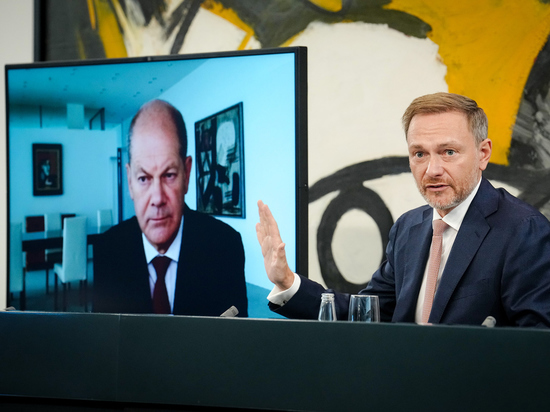Germany prints 200 billion euros set aside for a rainy day
[ad_1]

Germany plans to spend up to 200 billion euros to help consumers and businesses amid the energy crisis, German Chancellor Olaf Scholz said Thursday at a joint press conference with Finance Minister Christian Lindner and Economics Minister Robert Habeck. To implement this measure, the government will resume the work of the economic stabilization fund.
It was previously used during the global financial crisis and the coronavirus pandemic. However, some experts are skeptical about such a measure, calling it only the “sleight of hand” of German politicians.
The administration of German Chancellor Olaf Scholz is repurposing a fund created to compensate for the consequences of the coronavirus pandemic and replenishing it with additional cash, writes Bloomberg. This measure is expected to limit gas prices. In addition, the government is working on a plan to reduce electricity costs.
“Prices should come down. This is our conviction,” Olaf Scholz confidently told reporters on Thursday in Berlin. He compared the current plan to a “big protective umbrella” for the economy. He did not forget to blame Russia, too, saying that Moscow is turning energy supplies into “weapons at the international level.” All worked out details of gas price restrictions and recommendations of the expert group will be presented in mid-October.
The concern is understandable. Germany is particularly vulnerable to rising energy prices due to its heavy dependence on gas imports. The rise in prices caused by the reduction in these supplies encourages companies to limit production and undermines the purchasing power of consumers.
Price containment is expected to help keep demand high. All this is happening against the backdrop of soaring inflation. For the first time in decades, it hit double digits, hitting 10.9% in September.
Leading economists warn that the country is facing a recession as all citizens’ money is spent only on food, fuel, electricity and heating. “We are slipping into a recession and will only come out of it next spring,” says economist Thorsten Schmidt.
The proposed measure was not to the taste of some experts. Bearing in mind the situation in the UK, experts predict possible inflation and currency devaluation in Germany as well. But Treasury Secretary Lindner was quick to appease critics, adding that Germany was “obviously not following the UK’s lead in fiscal policy.” “This process is not risky,” the minister said.
But the experts are not quiet. The Special Anti-Crisis Fund is a sleight of hand that will allow Germany to return to debt-to-GDP limits next year only on paper. It was created in 2020 and filled with 500 billion euros to help businesses affected by quarantine measures. Although it is still funded by the government taking on new debt, the fund can only be used to pay for specific activities. Based on this, it is not considered part of the federal government’s regular budget.
Lion Hirt, a professor of energy policy at Berlin’s Herty School, argues that limiting gas prices is “absolutely the wrong approach” and will lead to fuel shortages. “Industry will stop putting all its effort into saving, storage facilities will become empty, politicians will eventually have to forcibly close companies on a large scale,” Hirt said.
The authorities will use their Economic Stabilization Fund, which is not part of the regular federal budget, to finance gas price caps. Together with a special fund for the modernization of the German armed forces financed by debt, the government is increasing extrabudgetary borrowing to 300 billion euros.
In parallel, Scholz’s team is canceling the gas tax for consumers, which was supposed to come into force on Saturday. And this seems to be one of the few good news.
The levy was originally intended to compensate energy suppliers for increased import costs. But later, upon closer inspection, it began to be perceived as politically toxic. Then some energy companies, which are already making record profits, would win even more. Ordinary consumers would have continued to carry the burden of the economic crisis on their own shoulders.
Measures are needed. They are accepted. However, their effectiveness is questionable. Already now, due to high prices, steel and fertilizer producers stop production, declaring that it is unprofitable. The current measure seems to be not bad, but really only on paper. German economists themselves warn that limiting gas prices could lead to higher inflation and reduce the incentive of households and businesses to save energy.
And for a reason, the head of Germany’s federal grid agency warned this week that savings targets are not being met, households use more, not less gas compared to previous years.
[ad_2]
Source link






